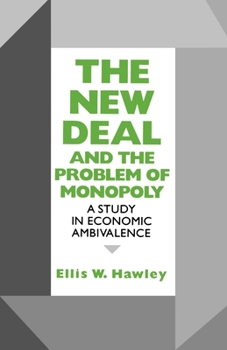New Deal and the Problem of Monopoly: A Study in Economic Ambivalence
Select Format
Select Condition 
Book Overview
A re-issue of this classic study of President Roosevelt's adminstrative policy toward monopoly during the period of the New Deal, updated with a new introduction by the author.
Format:Paperback
Language:English
ISBN:0823216098
ISBN13:9780823216093
Release Date:January 1995
Publisher:Fordham University Press
Length:525 Pages
Weight:2.85 lbs.
Dimensions:1.2" x 5.4" x 8.5"
Customer Reviews
1 rating
American Industrial Policy and its Discontents
Published by Thriftbooks.com User , 25 years ago
This is a detailed examination of New Deal industrial policy and how it attempted to grapple with the problem of "monopoly." The problem, in short, is this: Americans want the benefits of large-scale industrial production such as lower prices, greater economic security, etc. At the same time, we suspect that such a system may threaten individualism and democracy through over-bureaucratization and concentration of power. This ambivalence is reflected in the incoherence of New Deal policy. The book traces the evolution of policy from the government-sponsored cartels of the NRA in the early days, to the partial planning in agriculture and transportation, to Thurman Arnold's vigorous antitrust campaign of the late 30s. The final section of the book deals with FDR's response to the 1937 economic downturn, when broad reform programs gave way to deficit spending. This is also the story of the conflicting goals of different schools of thought within the Roosevelt Administration: At one end were the planners who saw "bigness" as inevitable and beneficial, but who wanted a more centralized process of economic decision-making. At the other end were those antitrusters who wanted to break up large organizations in the name of "competition." Professor Hawley points out that these conflicting approaches resulted not only from economic theorizing but also from a "clash of values," values inherited from the Hamiltonian and Jeffersonian traditions respectively. I recommend this book not only for majors in History or Politics, but also for general readers who want to think more clearly about political economy. Professor Hawley clearly defines his problem and examines the record thoroughly. He offers no neat solutions, but sheds much light through his scholarship.






